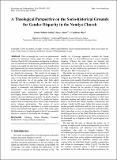A Theological Perspective on the Socio-historical Grounds for Gender Disparity in the Nomiya Church

View/
Publication Date
2015-08Author
Sudhe, Samuel Otieno
Gumo, Sussy
Iteyo, Crispinous
Metadata
Show full item recordAbstract/
Rites of passage are a universal phenomenon marked by transitions during major life changes. In the Nomiya Church (NC) circumcision and baptism as religious rites of initiation are simultaneously performed on the male infant on the eighth day after birth whereas the female infant gets baptism only but on the fourteenth day. The practice of simultaneous baptism and circumcision is hereby referred to as a double rite of passage. This double rite of passage in the NC for the male members apparently gives the male an edge over the female. The double rite of passage is connected to the purification rite of the mother after birth which demands that she is confined. The NC, the first African Initiated Church (AIC) in Kenya started among the Luo people, a community that traditionally did not practice circumcision. The socialization of the Luo community entrenched male domination and leadership while encouraging female submission. Specifically, this paper explores the socio-theological grounds for gender disparity in the NC. Gender disparity in the NC is a product of various aspects of the worship and practice that exclude women from active religious participation. This system of social structures and practices manifests in a social environment where men dominate and oppress women. This study argues that the instances of gender disparity in the NC are connected directly or remotely to the double rite of passage
